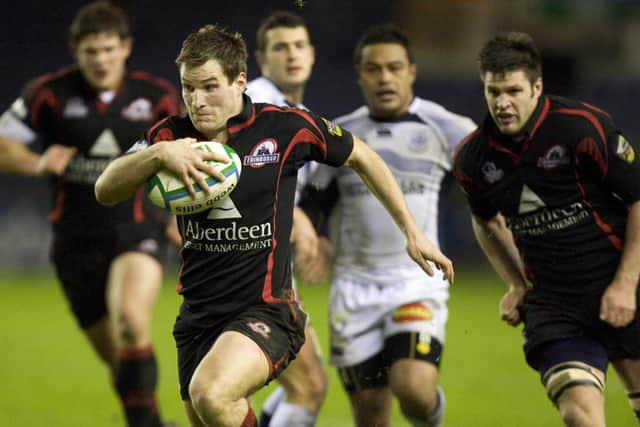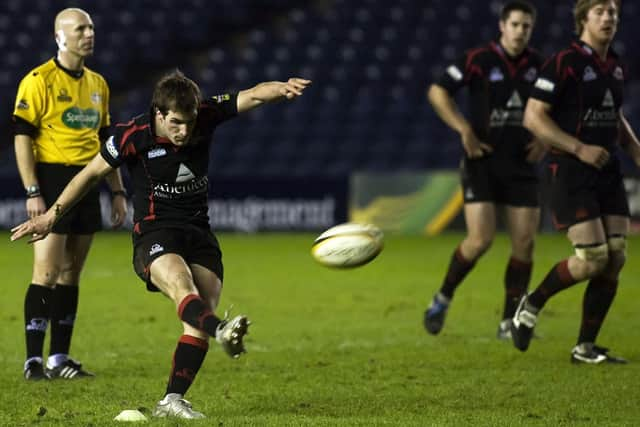Phil Godman on fireworks against the French, learning from Jonny Wilkinson and his Edinburgh v Castres homecoming
Phil Godman has good memories of Castres. The gifted stand-off was pulling the strings for Edinburgh when they beat the French side home and away in the 2008-09 season and will be guest of honour at Hive Stadium today when the sides lock horns in the Challenge Cup. Godman, now 41, will deliver the match ball in what is a rare chance to see his home-town club in action. Now head of elite sport at the High School of Dundee, Godman’s weekends are mostly taken up with coaching as he helps to bring through the next generation of talented players.
Talent was something the 23-times capped fly-half had in abundance during a career which saw him understudy Jonny Wilkinson at Newcastle Falcons before returning home to sign for Edinburgh for whom he made 150 appearances. Europe was always a stage he relished, particularly when playing French teams, and he was part of the squad which helped Edinburgh reach the Champions Cup semi-finals in 2012 which remains their best ever performances in continental competition. It was Godman who kicked a last-minute drop-goal for Edinburgh to clinch victory over Racing Métro in a crucial pool match in Paris that season but it was another landmark win in France four years earlier which is more relevant this weekend.
Advertisement
Hide AdAdvertisement
Hide AdWhen Edinburgh defeated Castres 13-6 in October 2008 it was the first time the capital side had won a Heineken Cup match on French soil. Guided by the coaching team of Andy Robinson and Rob Moffat, Mark Roberstson, now Edinburgh’s head of strength and conditioning, scored the game’s only try in a hard fought win at the Stade Pierre Antoine.


“I remember when we played them away it was the first time a Scottish team had won in France for years so it’s a good memory,” recalls Godman of a match which had extra personal significance because it was his 100th for the club. It was Edinburgh’s first ever Heineken Cup win in France and I remember Andy Robinson saying it was a big thing. It was a good game over there and a good night out after. It’s not often you win in France so we made the most of it. I don’t remember many games but I do remember that one! It was a tough game but we played well. They had a good team – like they do now – and it wasn’t like a meaningless game, it was one of the earlier ones in the competition so it was a big win.”
“The European competitions are special, especially when you’re playing away against the French teams,” added Godman who scored a try in a 32-14 bonus-point win over the same opponents at Murrayfield later that season. “You go to some of these venues, like Castres and Toulouse, and the fans over there are normally pretty vocal. It’s a different experience and one I really enjoyed. Towards the end of my career I was considering going to France and I was close to going to Perpignan but then I got injured. As a rugby player, you appreciate the atmosphere in France because they love the game and it can be a really positive experience.
“It can be hostile. I remember the first time I played over there and I think it was against Perpignan and our coach at the time, Frank Hadden, told us, ‘Be aware, it’s going to be hostile’ and then you go out and bloody hell! It’s a completely different level to what we were used to back in Scotland. But it was great. It was an evening game with fireworks going off so it was entertaining and a little bit intimidating as well.”
Taking his first steps in the professional game alongside Wilkinson could have been intimidating for Godman but he says the England legend couldn’t have been more encouraging when he signed for Newcastle. A prodigiously talented schoolboy player with Merchiston Castle, Godman moved out of his comfort zone to join the Falcons.


“There were only two pro teams so Scotland was quite limited and at that time the Newcastle Falcons academy was very well regarded, seen as the best in the UK almost, with some Kiwi coaches,” he explains. “So to broaden my rugby horizons that is where I thought I would be best suited. If I’d stayed in Edinburgh I would have played for one of the clubs. Newcastle was a really good route for getting experience through A team rugby and under-21s with some quality players. And when I signed Jonny Wilkinson was there so in terms of an apprenticeship it was a really good experience.
“What you find with these guys is it isn’t rocket science, it’s about work ethic and mentality. He was always very open with his time and very humble. He was amazing. And I was glad to see him go off and do what he did at the end of his career because he deserved to go and win something tangible with a club, which he did with Toulon.”
If Godman had a reputation of being something of a maverick, he also proved himself adept at managing the big games when the occasion demanded. He was a steady hand at the tiller when Scotland beat Wales at Murrayfield in the 2007 Six Nations, then played his part as Scotland won a Test match in Argentina for the first time a year later. But his finest hour in dark blue came in 2009 when he piloted Scotland to a memorable 9-8 home win over Australia. Godman kicked two penalties and was part of a heroic defensive effort which head coach Robinson later described as “the most courageous performance I’ve ever been involved in”. It was the Scots’ first win over the Wallabies since 1982.
Advertisement
Hide AdAdvertisement
Hide Ad“Yeah, it stands out,” says the self-effacing Godman who feels Scotland could have achieved more in that period. “We never competed at the level we should have. Sometimes it was small margins. But I look back with a glass half full. I was injured for the World Cup and I would have loved to have played in that but I don’t have any regrets. With Scotland at that time you were normally under pressure, you’d lost a few games and you’d play within yourself a bit and actually you’re better just going for it. Certainly when I’m coaching now I try to instil that mentality. It sounds very simple to go out and express yourself but sometimes when you unleash the shackles it doesn’t end up well. I look back and sometimes think ‘why didn't I just relax?’”


It’s a philosophy he has tried to bring to his work with the teams at the High School of Dundee, where he has been for seven years. “It’s great to still be involved with rugby,” he added. “After I finished playing I took a break from it completely then I got into this and I can coach youngsters and giving back a bit. I’ve really enjoyed it and feel quite blessed to have a good transition from professional to a different career which can be a hard transition. To stay within rugby and stay within sport with like minded people definitely makes that easier. We’ve got some good youngsters lower down the school and also a few older ones involved with Caley and Scotland. We’re not blessed with big massive players so we have to play a quick, very skilful game which suits my coaching style and it’s exciting for them as well and they’re great kids to coach. I really enjoy it.”
Comments
Want to join the conversation? Please or to comment on this article.
